Roman emperors were the designated rulers of the empire which started after the end of the Roman Republic. The legitimacy of an emperor’s rule was dependent upon his control of the army and recognition by the Senate; an emperor would normally be proclaimed by his troops, invested with imperial titles by the Senate, or both.
But the Roman people regarded their emperors as the equivalent of kings, even though the very first emperor Augustus the Great absolutely refused to be seen as a monarch. The age of the Roman Republic came to an end with the death of Julius Caesar, and Augustus marked the beginning of the Roman Empire that lasted from 27 BC to 476 AD.
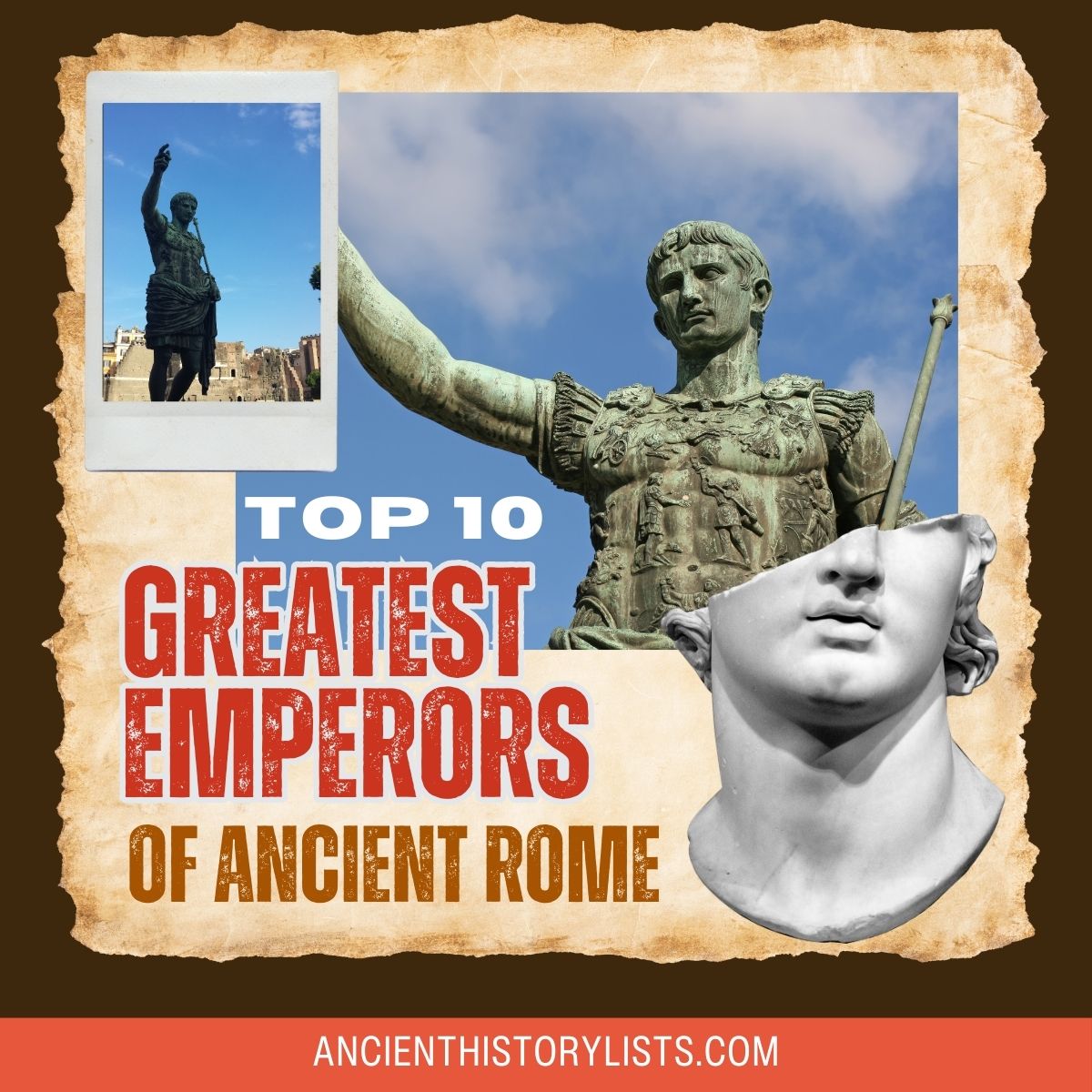
Throughout this period, a number of emperors ruled and their reigns were divided into a number of dynasties.
Here is the list of the top 10 emperors who ruled in ancient Rome:
10. Justinian (482 AD – 14 November, 565 AD)
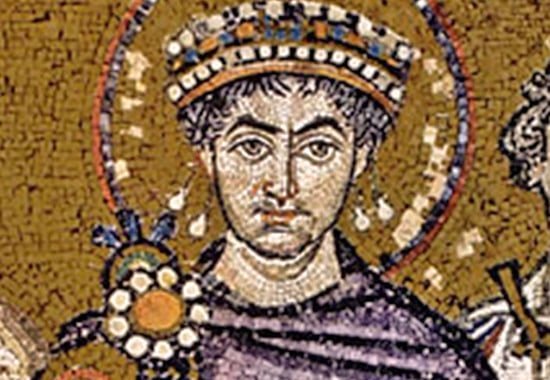
Though the Western Roman Empire had already fallen to the barbarians by 476 AD, the Eastern Roman Empire saw one last reign under Justinian I, who ruled the east (also called the Byzantine Empire) from 526 to 565 AD.
During his reign, Justinian sought to revive the empire’s greatness and reconquer the lost western half. His great generals Belisarius and Narses reconquered many parts of the empire, including the city of Rome itself. Because of his restorative activities, Justinian has sometimes been called “the last Roman” in modern history.
Justinian was well known for creating a unified code of law, the Justinian Code, that was based on a collection of already used Roman laws. This code has subsequently been taken as the basis of all systems of law in the Western world.
Justinian also oversaw the construction of great buildings in his capital of Constantinople, the most remarkable of them being the Church of Hagia Sophia, which later became the center of Eastern Orthodox Christianity for many centuries. But then came a devastating outbreak of bubonic plague in the early 540s which eventually marked the irreversible period of Roman decline.
9. Constantine the Great (February 272 AD – May 337 AD)
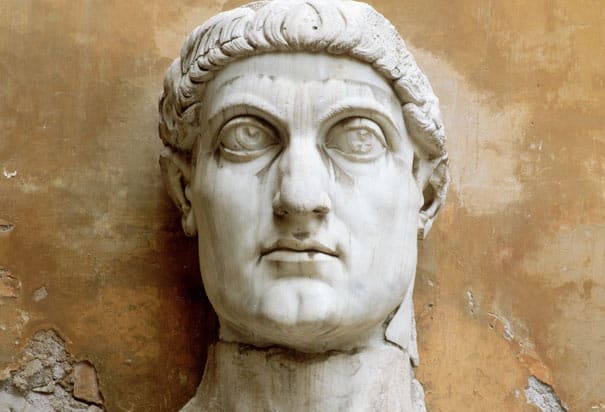
Constantine’s full name was Flavius Valerius Aurelius Constantinus Augustus. This famous emperor, who went on to become the first Christian Roman emperor in history, was a ruler of major historical importance.
He reunited a divided empire under a single emperor and scored important wins against some fierce enemies like the Franks, the Alemanni, the Goths, and the Sarmatians. He also reoccupied some of the long-lost Roman provinces. He created his own capital and named it after himself – Constantinople – which went on to become the capital of the Byzantine Empire for centuries. For that reason, he was also known as the founder of Byzantium.
He understood the need for Christian support, as Christianity was on the rise and he eventually became an important historical Christian figure being the first emperor to adopt the faith. The Church of the Holy Sepulchre, built on his orders at the purported site of Jesus’s tomb in Jerusalem, became the holiest place in Christendom. His conversion went on to have a significant impact on the religious preferences of the subsequent Byzantine Empire.
8. Antoninus Pius (19 September, 86 AD – 7 March, 161 AD)
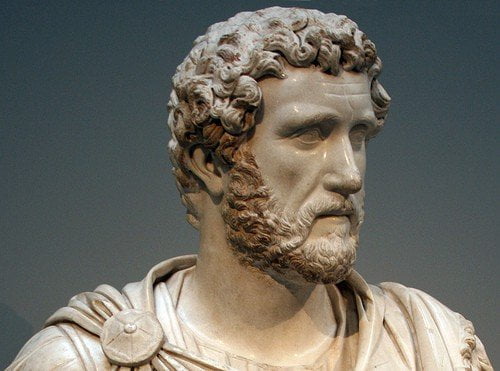
The adopted son and successor of Emperor Hadrian, Antoninus Pius ruled the Roman Empire from 138 to 161 AD. His first act as emperor was to grant honors to his adoptive father Hadrian. And as a part of the deal, Antoninus adopted the future emperor, Marcus Aurelius.
He was one of the most peaceful rulers in the history of the Roman Empire. There are no records of any significant military action during his reign.
He built temples, theaters, and mausoleums, promoted the Roman arts and science, and bestowed honors and financial rewards upon the teachers of rhetoric and philosophy. Antoninus was virtually unique among Roman emperors because he dealt with these crises without leaving Italy once. This style of government was highly praised by his contemporaries and later generations.
7. Vespasian (November 9 AD – 23 June, 79 AD)
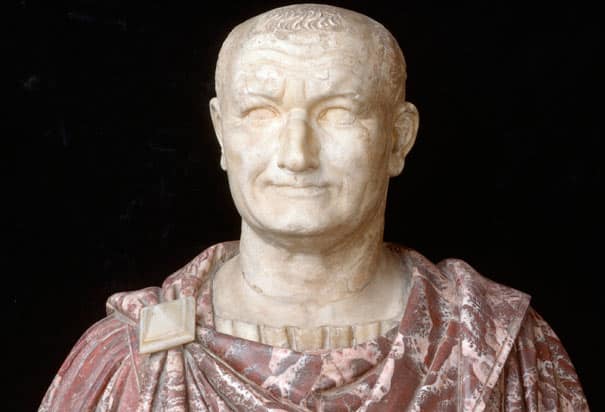
A famous Roman emperor, Vespasian’s reign lasted from 69 to 79 AD. He founded the Flavian dynasty that went on to rule the Roman Empire for 27 years.
His rule began during one of the most troubled times in Roman history as the Romans were just recovering from the antics of infamous emperors like Nero and Caligula, and a civil war that saw four emperors in a single year.
A down-to-earth man himself, and a competent general who had proved his mettle on the battlefield, Vespasian was handed the task of bringing balance to Rome. And during his rule of 10 years, he did just that, earning his name as one of the greatest Roman emperors.
During Vespasian’s reign, much money was spent on public works as well as on the restoration and beautification of Rome. He initiated the construction of the Temple of Peace, a number of public baths, and one of the most majestic structures in ancient Rome, the Colosseum. Sadly, by the time the Colosseum was completed, Vespasian was dead. After his death in 79 AD, he was succeeded by his eldest son Titus and thus became the first Roman emperor to be directly succeeded by his own natural son, establishing the Flavian dynasty.
See also:
Top 10 Famous People in Ancient Rome
6. Hadrian (January 76 AD – 10 July, 138 AD)
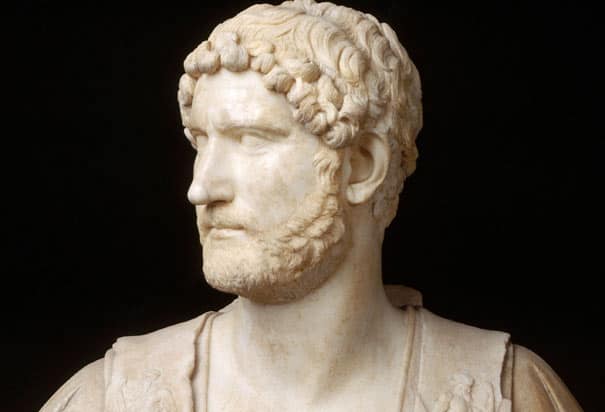
Emperor from 117 to 138 AD, Hadrian was born Publius Aelius Hadrianus to an ethnically Italian family. Even though his predecessor Trajan never officially designated him as his heir, Trajan’s wife declared the appointment just before his death.
Hadrian visited nearly every province under his rule, connecting to the people at a provincial level. A known admirer of Greece, he sought to bring Greek architecture back to its old glory. He rebuilt the Pantheon and constructed the Temple of Venus and Roma. He also built Hadrian’s Wall which marked the northern limit of Roman Britain.
Hadrian spent a considerable amount of his reign with the military, wearing military attire and at times dining and sleeping with the soldiers. Maintaining an alert and responsive military was his biggest challenge, so he would raise false alarms at times to test his army’s training, drill, and response to a sudden crisis. But despite his reputation as an efficient military administrator, his reign was marked by a general lack of major conflicts, apart from the Second Roman-Jewish war, which he handled rather cunningly.
5. Claudius (August 10 BC – 13 October, 54 AD)
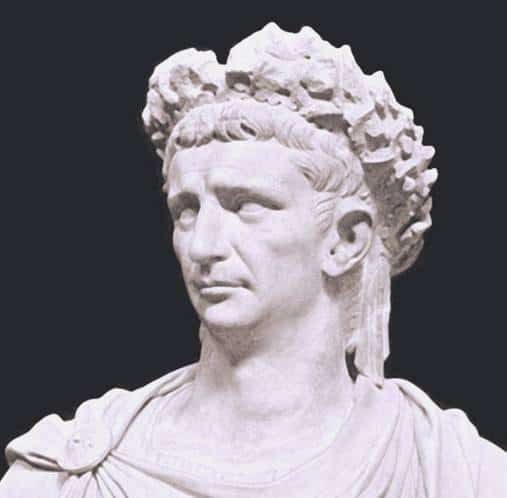
One of the first Roman emperors to have been born outside Italy, his reign lasted from 41 to 54 AD. He was the son of Drusus and Antonia Minor, and because he was afflicted by a limp and slight deafness, he was rather unfairly ostracized by his family and excluded from public office until his consulship. But as it happens, this particularly infirmity directly or indirectly saved him from the same fate as Tiberius and Caligula, for potential enemies never saw him as a serious threat.
His rule was seen to be vulnerable in the eyes of the nobility and the Senate for they thoroughly opposed his ascension to the throne, but he got his biggest support from the military. Claudius was a positive mishmash of conflicting characteristics: absent-minded, hesitant, muddled, determined, cruel, intuitive, wise, and he was dominated by his wife and his personal staff of freedmen. But despite all these and his evident lack of experience, Claudius proved to be an able and efficient administrator.
He was also an ambitious builder. He constructed many new roads, aqueducts, and canals across the empire. During his reign the empire began the conquest of Britain. Having a personal interest in law, he presided at public trials, and issued up to 20 edicts a day.
4. Tiberius (16 November, 42 BC – 16 March, 37 AD)
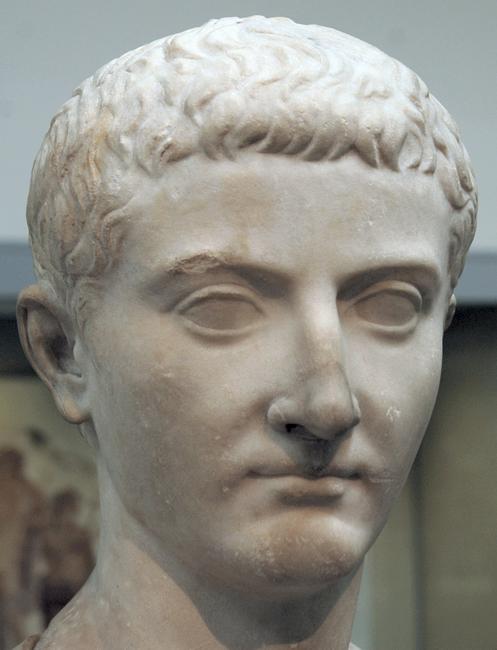
Emperor from 14 to 37 AD, Tiberius Claudius Nero was the son of Livia Drusilla, who later married Augustus in 39 BC, making him Augustus’s stepson. He was later adopted by Augustus as his heir, and that was when he took the name Tiberius Julius Caesar, a name subsequent emperors would also take.
Tiberius was one of Rome’s greatest generals, conquering Pannonia, Dalmatia, Raetia, and temporarily, parts of Germania, laying the foundations for the northern frontier. But he was remembered as a dark, reclusive, and somber ruler who never really wanted to be emperor, having the responsibility thrust upon him.
Despite his overwhelmingly negative image left by Roman historians, Tiberius left the imperial treasury with nearly three billion sesterces upon his death. Rather than embarking on expensive conquests, he decided to build additional bases and use diplomacy over conflict.
All these innovative steps paid off as Rome became a stronger, more consolidated empire. Were he to have died prior to 23 AD, a period marred by the Purge, he might have been hailed as an exemplary ruler.
3. Marcus Aurelius (April 121 AD – 17 March, 180 AD)
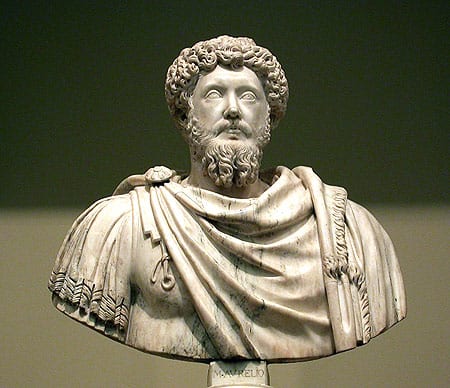
Considered to be the last of the “Five Good Emperors,” and a stoic philosopher, Marcus Aurelius ruled the Roman Empire from 161 to 180 AD. During his reign, the empire defeated a revitalized Parthian Empire in the east, and in central Europe, he triumphed over the Marcomanni, Quadi, and Sarmatians in the Marcomannic Wars, just as the threat from the Germanic tribes was becoming a troubling reality. A possible revolt in the east led by Avidius Cassius might have caused serious issues if it had gained momentum, but Aurelius suppressed it immediately.
A remarkable philosopher and writer, Marcus Aurelius’s stoic tome Meditations, written in Greek while on campaign between 170 and 180 AD, is still revered as a literary monument to the philosophy of service and duty, describing how to find and preserve equanimity in the midst of conflict by following nature as a source of guidance and inspiration.
Marcus Aurelius acquired the reputation of a philosopher king within his lifetime, and the title would remain after his death as he became known as “the Philosopher.”
2. Trajan (September 53 AD – 8 August, 117 AD)
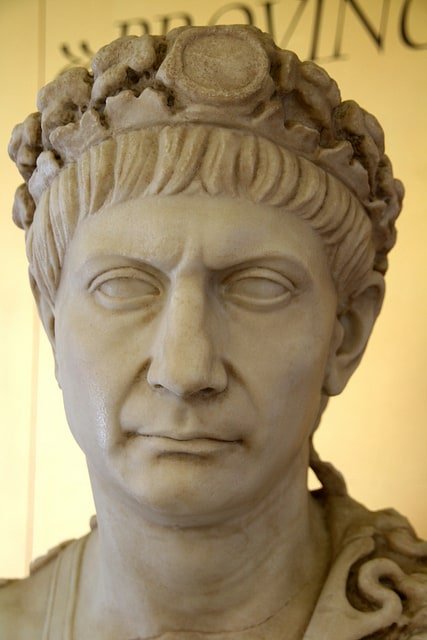
Famously declared by the Senate optimus princeps or “the best ruler,” he ruled ancient Rome from 98 AD until he took his last breath in 117 AD. Trajan is one of Rome’s most outstanding emperors and under his rule, the empire reached its peak.
He is remembered as a successful soldier-emperor who presided over the greatest military expansion in Roman history, leading the empire to its maximum territorial extent by the time of his death. He was respected by the common people, the Senate, and the military, having made his name through his philanthropic rule that oversaw extensive public building programs and welfare policies.
As an emperor, Trajan’s reputation has endured. He was one of the few rulers whose reputation has survived for 19 centuries. In the 18th century, historian Edward Gibbon’s popularized the notion of the Five Good Emperors, and Trajan was second.
Each new emperor after him was honored by the Senate with the wish felicior Augusto, melior Traiano which meant “be luckier than Augustus and better than Trajan.”
1. Augustus (September 63 BC – 19 August, 14 AD)
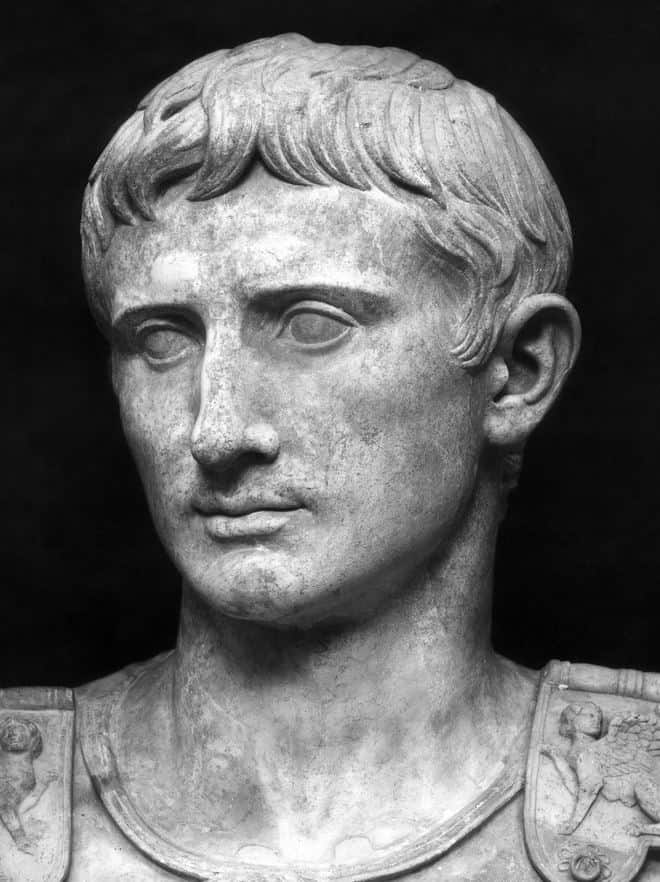
At the top of the list is a very obvious choice – the founder of the Roman Empire himself, Augustus, who has the longest reign of 41 years from 27 BC to 14 AD. Born under the name Octavian, he was given the name Augustus by the Senate as an honor for his great achievements.
He went on to avenge the death of Caesar together with Mark Antony, before falling out with him. He defeated Mark Antony and the famous Egyptian queen Cleopatra and afterwards, together with the Roman Senate, created a new constitution for the great empire.
The reign of Augustus initiated an era of relative peace that was known as Pax Romana or the Roman Peace. Yes, there were several wars at the Roman frontiers in the name of expansion and a year-long civil war too, but after the succession of Augustus to the throne, the Roman world was free of any large-scale warfare for more than two centuries.
Augustus ruled wisely and built roads, aqueducts, and buildings. Not only was Augustus the first, but he was most certainly one of the best emperors Rome has ever had.
Conclusion
The Roman Empire saw a number of different emperors, many of whom enjoyed a stable and relatively peaceful reign. However, Rome also saw times of crises such as one single year with four emperors and another year with no less than six. And there were some rather infamous and notorious emperors such as Caligula and Nero whose reigns led to great turmoil.
All the emperors listed here had a minimum reign of 10 years each. They also made significant contributions to the expansion of Roman boundaries and Roman culture. One name that should not be forgotten, however, is the famous statesman Julius Caesar.
What he started by famously taking the state and Senate in hand led to a chain of events that led to the foundation of the Roman Empire.
Nice list! I do have to point out one mistake from the excerpt on Claudius. "He was the nephew of rather infamous emperor Caligula" It's the other way around, Claudius was Caligulas uncle.
For me, the most fascinating of the Emperors was Claudius. He certainly had his faults but be was a survivor, was considered a student of history, and although not a soldier, undertook the beginning of the conquest of Britain. I think he did quite well in his governance of Rome until done in by Nero and his love of mushrooms.
what about nero, im pretty sure he was great (well famous)
Nero is actually infamous for making himself a god and persecuting Christians and even making a statue of himself outside the Colosseum, but was loved before he did that.
If Nero was so bad, why was he so popular with the plebeian of Rome that his successors Otho and Vitellius had to style themselves after him and pay tribute to his spirit?
The Colosseum was built by Vespasian, after Nero was gone. Many of the “Christians” he persecuted, were followers of different “Christs” than the one in the Bible. There were a series of rebellions led by Zealots, with their leaders known as Messiahs (Christ/annointed ). This conflict was finally put down by Emperor Vespasian and written about by the great historian Josephus.
This is a slightly different history account than was taught to us by Hollywood movies.
I think Aurelian really belongs on this list, along with Diocletian
I agree, but I would like to point out that Julius Caesar deserves to be top three, due to his glory in battle, spreading of Roman territory, great adventures, and fairness as well as popularity among his people.
I completely agree with you but here the author is talking about the time period between 27 BC-476 AD (Roman Empire) and Julius Caesar died in 44 BC.Moreover,Augustus was the founder of the Roman empire and the first roman emperor whereas julius caesar was the consul/dictator of the Roman Repbulic and therefore can not be included in this list.
You crazy? Constantine and upward of that destroyed the Roman empire, they tore down everything created by Augustus. The incredible structures.
It is said that Augustus didnt care about luxury, so he donated his money to building/rebuilding and restoring temples and structures.
Waste really since they were destroyed by Christian rulers later in history
What do you mean?! Constantine was one of Rome’s greatest builders. He built numerous cities, roads, and especially, forts, reinforcing the border. And that’s not to mention all his other accomplishments, such as his foreign campaigns winning victories against the Franks, Alemanni, Sarmatians, and Goth, and his reconquest of the Limes upper Rhine Raetia and Dacia, both territories abandoned by earlier emperors, and his incredible victories over Licinius and Maxentius, and his many administrative and monetary reforms, many of which brought back older Roman traditions abandoned by his predessessor.
I’m astonished that he’s ranked below Tiberius, Vespasian, and Antoninus Pius(the guy would literally did nothing his entire reign)!
Justinian was a great builder, too, building and rebuilding many, many cities.
Constantine is also credited with changing land ownership rules, which created the “serf” system, where the farmers became owned by their lords and NOT allowed to relocate. This was the jumping off point to creating Medieval Europe.
He was also the Emperor to make Christianity the national religion of the Roman Empire.
He was definitely a monster, but that never prevented anyone from being a “great” emperor…:)
My opinion is that the damage was done to the empire after the barbarian tribes started coming together, not Constantine’s fault.
Certainly a good part of Rome’s problem was the prosperity and increasing sophistication of the Germanic tribes on its border, Rome’s very success helped to make them stronger as they traded with Rome, many served with the Roman army and reached high office (mostly staying loyal to Rome) and brought their skills back home, and they became involved in Roman politics.
I agree. Tiberius really shouldn’t be in the top ten. There are several others like Valentinian I, Severus and Majorian who perhaps should be considered.
Yeah, Tiberius doesn’t cut it for me. But neither does Marcus Aurelius who I think is overpraised for his intellectualism but achieved relatively little in his reign except to bring his utterly unfit son to the throne.
You’re right on the last point. Commodus was a real fraudulent egomaniac. If I was Aurelius I would have killed him, rather than let him become emperor.
Aurelian very often doesn’t make any of the top ten of all time despite his well earned restorer of the world and unconquered son because he only ruled for 5 years before he was assassinated
Indeed. He deserves great praise not only for his military skill but his able use of diplomacy, particularly in bringing back the West with his agent the pseudo-emperor of the Gallic Empire segment. Only Justinian was more able in that sphere.
Tiberius?? Dear sir, you are mad and obviously haven`t red Seneca.
Exactly as it says: Tiberius was Emperor after Augustus, from 14 to 37, and did not care for the job. All he wanted was the luxury, and left the Senate to do all the ruling. The Senate despised him for this, and told the criticized him to the Roman populace, until he no longer trusted his safety in Rome and left for the island of Capri. He erected statues of his captain of the Guard, Lucius Sejanus, all over the city, and gave all the tasks of ruling to him. Tiberius more or less retired to Capri for the rest of his long life, only returning to Rome a few times.While he lived on Capri, he had a huge villa built for him, Villa Jovis, the Villa of Jove (Jupiter), in which he indulged his pedophilia. He swam naked with and raped infants, toddlers and young boys. He did not otherwise physically harm them in any way, but even in his late seventies, sex with young children was one of his favorite pastimes. SO NO TIBERIUS IS A MAD RULER HE CANT DRAW A straight line!!!!
What about Theodosius the Great?
His father was truly a great general, but Theodosius the emperor is called “great” by some people mainly because he accelerated the Christianization of the Roman Empire. He did win some military victories, but those battles were not as decisive as those of some other emperors like Aurelian, Julian and Trajan.
was he the heir of augustus ?
Tiberius was the step-son and heir to Augustus.
i thought caesar was the most well known empire/emperor
the author is talking about the time period between 27 BC-476 AD (Roman Empire) and Julius Caesar died in 44 BC.Moreover,Augustus was the founder of the Roman empire and the first roman emperor whereas julius caesar was the consul/dictator of the Roman Repbulic and therefore can not be included in this list.
Well, Justinian is sandwiched in as he’s usually considered the last true Roman emperor. I however like to view the whole crew down to Constantine XI as Roman emperors. And the remarkable thing is if you take the whole group in context, comparisons to our modern era rulers (including US presidents but for the violence), they are a remarkably capable lot for the most part with many fine, some truly compassionate, dedicated rulers, some truly able and brilliant and courageous, and relatively few true monsters. Even some who seemed destined to be poor rulers proved to be capable and grew in the throne. A fascinating lot.
Julius Caesar was not an emperor, Augustus was the first emperor but he was Caesar’s “step-son/ step-nephew”. Then again I am still learning about this so other people might have their own thoughts.
Minor correction. The greatest territorial expansion happened under Augustus. He doubled the territory in his time as Princeps. Trajan added Dacia and temporary parts of Parthia only.
‘He ruled the ancient Rome from 98 AD until he took his last breathe.’
Not sure if this is the correct spelling for breath in this context.
Augustus may have added more territory to the empire than trajan but the reign of trajan saw the roman empire reach its biggest territorial expanse
Cincinnatus is one of my favorite “emperors”. He was given power to save Rome and after successfully doing so he bequeathed his powers back to the senate…twice!!
Doug,- Cincinnatus was born in 519 BC,ten years before the founding of the Republic.
The Empire didn’t come into existence until 27 BC.Kind of counts him out.
Not really. With the accuracy of this list, you might as well have put Nero at the top.
Aurelian (270 – 275 AD) should be in this list.
He did what no other emperors did in a mere 5 years.
& sorry but Marcus Aurelius is overrated. :P
I agree. I’d have Trajan, Augustus and Aurelian as the top three.
honestly…. where are Constantine I, Basil II and John II?
Basil II was amazing if prickly and foolish about not getting an heir but he also is outside the time period as is John II and the greatest of them all, in my humble, Alexis I of the Commeni. I still have great admiration for team Justinian/Theodora and I love Romanus I the gentlest and kindest of the emperors.
Not sure about Justinian. His invasion and re-occupation of what was left of the Western Roman Empire and subsequent evacuation destroyed what little order the Goths had managed to salvage from the collapse and brought on the Dark Ages in Europe.
I can’t agree, though Italy took heavy destruction in the long war after things went badly in part due to wrangling among the conquering Byzantine generals. After Theodoric the Ostrogoth kingdom and greater empire was falling into chaos. I think Justinian played things very well but for the bubonic plague and bad luck with Italy, particularly the death of his popular heir and potential Caesar/Augustus of the new Western Empire, Germanus, who was married to the beloved Goth princess Matasuntha. He might well have won the Goths over to Imperial rule based in Rome, especially as they’d offered General Belisarus the throne earlier. It took time but Byzantine Africa became quite prosperous and Italy could have proven a success, Sicily did. Most of the disasters attributed to Justinian’s supposed overextension came decades later and centered around problems with Persia and the worthless usurper Phocas. Imagine if Germanus had lived, become Caesar in the West and later Augustus and integrated the Goths into the Empire. The foothold in Spain could have been expanded, help might even have been sent to still partly Roman Britain. But what ifs fantasies are of course just that. Likewise Maurice might have paid his soldiers better and/or let them come home, and avoiding overthrow, kept peace with Persia and seen a gradual reconquest of Italy.
Does anyone have any great reads on Caligula? I have read so many conflicting stories on him. Not sure who would be a trusted source for info on his infamous rule.
Why Was Emperor Diocletian Not Included?
When you said “Aurelius” you meant Constantine. He was the first Christian Emperor, and that is who that bust is of.
Of the Julian-Claudian Dynasty, Tiberius may be the worst of all Roman Emperors. According to Suetonius, he out-eviled Caligula by a good margin.
1. Augustus – one of the most brilliant rulers in history. Restructured the failing Republic (with himself on top of course), and it endured for almost 5 centuries more as the Roman Empire.
2. Constantine the Great – sometimes called the first king. Again revamped an ailing empire by adopting Christianity and using that as a basis/justification for continued rule, and moving the capital to Constantinople, which would last for another 1000 years as the capital of the Eastern Byzantine Empire.
3. Justinian – I’m a little unsure if he should be included as an Roman Emperor, but this list did so I’ll roll with that. He revamped and consolidated what would become the Byzantine empire which then lasted another 800 years. However his invasions of western Europe to reunite the Roman empire were one of his mistakes as it drained the treasury and were of no lasting military or economic value.
Those are by far the top three emperors (if Justinian can be included), and to my mind its pretty hard to even argue the order. After that are a bunch of very good emperors, the order or which can be debated, but none of them are the giants of history that the above three are. Personally, I’d rank them
4. Diocletian…building on Aurelian’s success, brought back order and stability after more than a century of Roman decline, ultimately paving the way for Constantine the Great.
5. Vespasian…picked up the pieces after Nero got done fiddling while Rome burned.
6. Trajan…one of Rome’s greatest generals, under his rule the Roman empire reached its greatest extent. Nominated a worthy successor (Hadrian)
7. Aurelian….would be higher if he had ruled longer (maybe even top 3), and he might even have stolen the thunder of Diocletian and Constantine the Great in reorganizing and stabilizing the empire after a century of decline. Did a lot in 5 years, but died before he could consolidate his place in history.
8. Hadrian..consolidated the gains of Trajan, didn’t screw things up unnecessarily, which is very much an under-appreciated quality, and nominated a worthy successor.
9. Antonius Pius…an unremarkable reign, which is a good thing when times are good. He also resisted the impulse to go screw things up unnecessarily, and nominated a worthy successor.
10. Claudius….picked up the pieces after Caligula, and brought back a semblance of order and stability before it all went to heck again under Nero. A short competent interlude that doesn’t get the attention it deserves due to the madmen in power before and after him, which kind of makes his reign irrelevant.
11. Marcus Aurelius…would be higher (say around 8th) as he was a brilliant soldier and scholar, but he loses massive marks for designating his son Commodus as heir, when it was clear that he was not up to the job, This brought an end to the practice of the 4 emperors before him who had designated a worthy non-blood related successor (often adopting them as sons).
Tiberius and Domitian did rule competently from an economic and military standpoint, leaving money and a stable empire for their successors, but lose marks for massive human rights abuses, particularly late in their reigns, that leave them out of the top ten. Other worthies like Probus, Nerva and Titus simply did not rule long enough to justify a top 10 ranking.
He was a good emperor at the first half of his reign but then in the end he went full crazy and started killing people. So hje definitely doesn’t deserve such a high spot but he can definitely be on the list.
Some of these comments are truly insane. I know this is an old thread, but I cannot help myself.
I am no expert, mind, but I am confident that Tiberius and Claudius being on the list at all is dubious at best, and the exclusion of Diocletian is insane. Not only was he one of the most transformative emperors ever, with his reforms setting the stage for the Byzantine era in particular and the middle ages in general (serfdom, ‘divine’ rulers), but he inherited an empire that was a mess.
The whole governmental apparatus had become the supply arm of the military, essentially, by the time he ascended to the throne, and by the time he left the empire was on solid ground and at one of it’s historical peaks. That’s not to suggest he was perfect, his maximum price laws were laughably unenforceable, but nobody then understood inflation so how much can you dock him for that?
Claudius was fine, but basically the beneficiary of a horrible successor (reputation wise) and the inertia of Augustus machine.
Forodes, if you are out there, morals cannot be considered, unfortunately. Virtually every Emperor did things that we’d consider abhorrent. August and even good ol’ Claudius loved their proscription lists and purges, and the former in particular used them with impunity to get himself cash and land whenever necessary. Constantine executed members of his own immediate family. Nevermind the selfishness of the myriad of Emperors and their enemies, starting and waging civil wars that cost hundreds, thousands of lives just because they wanted to be the top dog. Again, Augustus is particularly guilty of this, as is the morally upright (by those standards) Julius Caesar, though he did technically proceed the principate.
But Augustus only killed rich senators and confiscated their estates during the days of the second triumvirate, no? To finance the civil war. Once his reign as the first Roman emperor began, he ceased with most of his earlier bloody tyrant-stuff.
I would remove Justinian and put in Diocletian instead. Justinian, hindsight being 20/20, drained significant financial resources and manpower in his reconquest of Italy, and the Empire lost them again soon after even so. Byzantium was thus I’ll prepared for the new threats of the next century. Diocletian, in the other hand, revived a flagging empire.
But that’s the fun of this kind of list isn’t it.
A very novice level list, at best. No mention of Aurelian or Diocletian. Also if you were going to include Eastern Roman emperors, i.e. Justinian, then there are a slew of far more capable rulers than the over-stretching and bankrupting Justinian (see Heraclius). Also Tiberius gave far too much power to the pretorian guards, which would have far reaching negative consequences.
So for those that think Caesar should be at the top you would be correct he should be atleast 2nd but he was never an emperor he was a dictator. Caesar created the idea of an emperor and there fore set Rome on a great path his nephew August’s/ Octavian finished his uncles Dream.
Constantine named his new capital “New Rome” not Constantinople.
Nero was the greatest of the early emperors. He codified Roman building laws to stop the fires that routinely ravaged the city, opened his palaces to people affected by the great fire of Rome as refugee shelters, fed them from his personal granaries, and at his death was so popular with the common people of Rome that two of his successors had to copy his style and offer tribute to his spirit.
Tiberius should not be on this list. He made his money through persecution, and boasted that he would be remembered well because he had raised Caligula/Gaius to be a serpent.
He did have victories, but as a General. As Emperor he was barely ever in Rome, and stayed on his pleasure island. He was too afraid to even approach Rome! I can see eye to eye with you on the rest of this list, but Tiberius (who was not Divus) is not deserving of the honour
>Constantine is also known as the founder of byzantium.
No, this is germanic propaganda.
The Byzantine Empire was the Eastern Roman Empire and just an eastern jurisdiction of the same empire, but Emperor St. Constantine was not even responsible for the east-west split.
That would be Emperor Theodosius.
Furthermore, if you’re operating under the faulty assumption that the Byzantine Empire is not the Roman Empire, then why would you have St.Justinian on the list?
Also, you would have to address the several ERE documents that shows the name Roman on them all, and the legitimate continuity in every way from the old ancient Roman Empire to the Romans of the Medieval period who are called falsely Byzantine
On your list though, I would say yes, but it is a shame Basil II, St. Nikephoros Phokas II, Alexios I Komnenos or even Michael VIII Palaiologos
Constantine THE GREAT should be far HIGHer on this list. And no he was a founder of the Byzantine empire BUT within that region he did find, base AND establish his very own Capital which was not only the strategic central capital of the Empire that developed InTo the most POWERFUL city in the world.